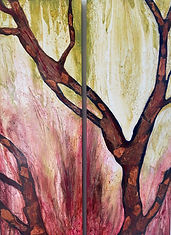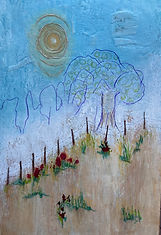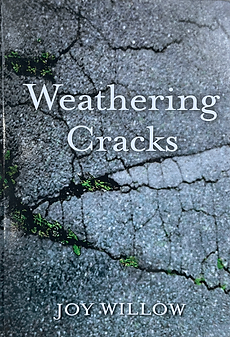
Firm Foundation
On the Trail

Manzanita

Hillside Flume

Foothill Pasture Lines

New Stratum

Skin Deep


It Dawned on Me

1.
CALLINGS OF THE SIERRAS (title of the collection)
Manzanita
We came to California. It’s as if the minerals in the mountain ridges of the Sierra Nevada have been a magnet drawing us from all corners of the country, indeed, the world. We came for gold, silver, for a better life; we came to raise crops, cattle, and our children in this land of trees and sunshine, fertile valleys, and prayer-inspiring cliffs. We encountered Native tribes in the sloping foothills; we watched salmon spawn in the mighty rivers; we discovered trees the size of giants; we met fire (that fearsome blessing); and we found evidence of those who came before us.
My own journey east from coastal Sonoma County was one of healing, seeking peace among the woodland oaks, finding strength in the spirits of people that once lived just outside my door. Human bones on this land near the Stanislaus River have recently been carbon-dated to be 7,000 years old. I can still feel the rhythms of their days; I hear their whispers at night.The land and the ancestors have inspired my work. Here are some of their stories and messages…
2.
SPAWNING
Hillside Flume
The flat side of her body
Flashes silver in the shallow water
As she thrusts her exhaustion
Against the rocky floor of the streambed.
She will continue bruising herself
Until the area is clear of sand,
A safe depression, or “redd”,
To deposit thousands of eggs.
We lean on the railing of Knight’s Ferry bridge
Looking down on 7 Chinook salmon,
Three evenly-spaced couples facing East,
And one young male trying too hard
For a key position in the group,
Getting himself, and his tail, rebuffed.
The water is shallow enough to see marks
On the long, dark bodies,
Evidence of a difficult journey.
Only 20 feet away unsmiling fishermen
Present a final silent threat to this ancient ritual
Of reproductive endurance.
When they finally pack up and leave
We are more relaxed, no doubt the fish as well.
The spawn of eggs will winter in the gravel bed.
If they are not disturbed nor eaten, and if
The temperature is just right next spring,
Some of them will finally hatch.
So many reasons for the improbability of salmon
Existing at all in the waters of this Earth.
These fish have weathered predation, pollution,
Too many dams, marathon miles of uphill swimming
All for the sake of the young smolts
Who will swim back down river towards the sea.
If they manage to survive the dangers of ocean living,
They will one day feel an inner call
Compelling them to return upstream.
A call heard in the voice of the hungry vulture,
The waiting osprey, the famished bear,
All nourished by the spent bodies of the salmon
As the cycle continues to roll with the tides.
This call is not unlike the one the poet heeds
At four in the dawn of morning,
When the up-stream waters of intuition hatch
Another unlikely poem from the spawn of reverie.
The barely formed idea is fueled
By embryonic yolks in little egg sacks.
The light is dim. It is cold.
Just the right conditions for writing.
Like a magnet, the call pulls the poet awake
To trace a line from source to sea.
Swimming up out of sleep to face the obstacles ahead,
The divergent phrases, the dammed connections,
Rigorous navigation over and under snagging sentences,
And those perfect words that escape on a fast current,
Only to disappear in darker waters.
It is a call to full vulnerability. To risk.
To be like the salmon who when faced
With a wall of water
Turn their undersides towards the slamming current,
Lean their tender bellies into the force as it hits them,
And in this way are launched, with each impact,
Up the waterfall,
Closer to the goal.
It is a call to courage. For it signals the end
Of this gulping form that has been moving bravely
Through treacherous floods. It has lead unerringly
To the source and emergence of words
Which move as they will among the rocks
To finally rest beside the poet
Alive in a riverbed of dreams
Under the palest of moons.
3.
THE SECRET LIFE OF TREES
Foothill Pasture lines
I. Roots: Internet of the Forest
We are a sugar pump. A brain. A message.
We crackle at 220 Hz. Send electrical signals to other trees.
We feed our tree. We keep old stumps alive for years.
We know the taste of our neighbors’ roots. We are all different.
If damaged or pruned, we cannot communicate. Isolation weakens us.
We suffocate if soil compacts around us, or noxious vapors swirl about us.
When desperate, we spread through pipes, even cement.
We perish from acids, salt, urine, fertilizers.
The tree relies upon us for wide support.
We manage all chemical activity through the fungal networks at our root tips:
like fiber optic cables weaving through the soil, these miles of cottony filaments
help us absorb water, nitrogen, and phosphorus for the tree,
and help us with communication, especially warnings about insects, bacteria, predators.
But this same fungus will cost the tree one third of all food production,
and use its hormones to take over cell growth.
We breathe for our tree when the leaves fall.
II. Trunk: Bending in the Wind
I desire to grow straight and tall.
I grow slowly when young, shaded by the canopy of my parents.
Too much sun and my cells will be too full of air, feeding fungal parasites.
I learn about stability, increasing my strength with every little wind-driven micro-tear.
Yet any wound over an inch can invite invaders.
When people paint my wounds, I die from dampness and rot.
I do strive to be upright and vertical so the weight is distributed when I am pounded
by heavy snows, driving rain and wind.
As I age my skin wrinkles. Mosses colonize the indentations.
If my roots can’t quench my thirst, I will vibrate in distress, screaming for water.
When I die I will give my substantial body to feed others.
Young trees will have a chance at more light and resources
when I lie down on the forest floor.
III. Branches: Empathy
We touch our neighbors with respect. We don’t grow into their space.
We don’t steal their light.
We all have to help each other, or else succumb to fire, lightning, ice.
We are wise. The key to a ripe old age is slow growth. Too fast and our resources
for defense are compromised.
Then parasites can weaken our wood, our branching arms felled by mistletoe,
honeysuckle and the squeeze of ivy.
As we age we grow wider. It takes too much energy to constantly send food and water
up against gravity. So we grow thicker rather than taller.
Our biggest fear are the machines that cut us back drastically, making us into
an ugly pollard struggling to ward off insect invaders and infections.
We love to serve. We provide the support for our leaves.
We are all about balance.
IV. Leaves & Seeds: Respiration, Metabolism, Reproduction
So much to do, so little time.
Breathing on the leafy undersides, releasing oxygen by day, carbon dioxide by night.
On sky-blue days we’re busy on the topside eating sunlight, with the help of chlorophyll,
making sugar, cellulose, carbs.
Our lungs can get clogged with pollution, fumes, or smoke, slowing us down,
shortening our life.
When we feel the bite of an insect or herbivore, we can identify it by its saliva.
Then we tell the tree to pump up some ethylene gas,
which is not only toxic to the predator, but also signals the danger to our neighbors.
So efficient.
Another feat is releasing water vapor which helps make clouds, sending rain inland.
Not too many offspring survive from the billions of seeds.
Many return to humus after being broken down by bacteria,
or carried off and eaten by birds, squirrels, or mice.
A winged design can spread a seedling far from its parents.
With age, leaves thin out at the crown. A common fate.
Production slows.
Yet weak or strong, each tree contributes its value to the surrounding forest.
Each has a role to play, an intelligence and a legacy that is passed on
through chemistry, genetics, and love.
4.
SMOKE AND ASH
New Stratum
Tiny particles of trees,
Yesterday alive in the summer breeze,
Covering the slopes and canyons of the Sierras
Now fractionalized, reduced to grit and carbon ash
Silently floating through the air
To fall and coat the land with a shroud of grey,
Sifting into gills of fish,
Into lizard’s skin,
Into the dreams of sleeping frogs,
Clogging the airways of ants,
Filming the eyes of the mantis,
Confusing the bee and the hummingbird
Laboring to feed through powdery deposits;
Juncos and red finches peck frantically
At a few seeds in the dirt--
The coming of Fall
Or panic response?
The streets are nearly empty for this time of day;
Everyone stays shuttered indoors
Watching a veiled red sun
Crawl across the smoky bowl of sky.
Rivers and streams are dusted with a dirty sheet of particles
Drifting down through slow-moving waters;
Our own fluids feel sluggish,
Our throats like sandpaper.
We worry about our lungs. We wear masks.
Surviving leaves and needles struggle with
Stoma cells sticky and closing;
The newborn coyote wheezes through the night;
Deer flee in all directions
Gasping for breath.
This has happened before,
It is inevitable. Yet we count the days,
Dreaming of rain
Which will settle and scatter the ashes of these beloved trees
Into their final resting places deep in cracks and creases
Between root and vine,
Feeding the soil with fire’s blessing
For generations to come.
5.
1860 SCHOOLHOUSE
Skin Deep
The imposing building of red brick
Sits perched on a rise,
A square two-story schoolhouse
With rickety staircases on north and south sides;
As I wander the dirt paths
Of this gold-rush town
I happen upon the school
With a strange shock of recognition;
Classic window lines lead the eye skyward
To the bell tower in need of paint,
A stone foundation adds to the sense of height,
This upright sentinel, guardian of memories;
A stillness arises within me,
All traffic, birds, internal chatter
Abruptly suspended
Echoing the quiet cemetery nearby;
The door is open to the lower classroom
An inviting display case allows full view of the room
But not entrance, like a dream almost within reach,
A dream whose characters have vanished into the walls;
I could see myself there
In front of the rows of desks
Wearing a fitted cotton dress and high-button shoes,
Handing out papers with delight;
The organ, the dunce cap, the wood stove, globe and flag
Are just as I remembered,
The blackboards list the children’s names
Next to their daily chores;
At once I am seized with sobbing,
Not gentle tears filling my eyes,
But an explosion of emotion, rare and sustained,
For which I have no explanation;
The display of tiny boards with subtraction and sums,
The hard-bound reading books,
The old-fashioned quill pens,
Do they still contain familiar fingerprints?
Feeling disoriented, I run down the stairs
Into the fresh air and around to the other staircase;
Breathing hard, I climb the steep steps to the top floor
Hoping the exertion will bring me to my senses;
The upper classroom smells musty and dank,
A couple of bats hug the high corner
Where moisture has stained the walls,
The plaster cracked and peeling down to the floor;
As if a window has opened
Into a lifetime long ago
I feel I know this school completely
Having been a teacher here;
Other pictures begin to form in my mind:
A covered wagon from the Midwest,
A young woman with education,
A sudden death in a crowd.
Now, over a century later, I am drawn to this place,
To live here in the Motherlode,
Make peace with the memories,
And continue the joy of teaching.
6.
BALDASARE’S ARMS. (For Baldasare Forestiere)
Firm Foundation
Part I
His arms rested easily
On the warm cloth of the café table;
Well-defined muscles, sinuous and dark,
Brimming with potential movement
As they lay still in the sun of this Mediterranean morning.
The aromas of coffee and blossoming branches
Entwined like the limbs of lovers, reaching deep into his desire,
Turning a key in his mind,
Opening a gate in the garden of his imagination;
As if in a dream
He saw flashes of his future
On a new continent, in this new century
In which he would make something new on the earth
With his arms.
He would go to America.
He would grow oranges there, perhaps in California.
He would live in a comfortable home
With a woman he would hold
In his arms,
With children he would cradle
In his arms,
Watching them play among
Groves of fruit-bearing trees;
The fertile soil would nourish many,
And his strong arms would make Eden bloom
Once again on the earth.
Part 2
His arms leaned heavily
On the church pew in front of him;
His hands folded in prayer,
His Catholic faith the only security
In this insecure world of hungry prospectors,
Fast- rising prices, and dry, scorching months of summer heat.
His meager savings did not go far in Orange County,
But it was rumored that in the Central Valley
Were acres of affordable farmland.
He would go to Fresno.
He would purchase tractable land.
He would plant his orange trees, digging
Into unyielding hardpan
Until his muscles gave out.
Long days with temperatures in triple digits
Gave way to restless nights too hot for sleep.
Where were the moist, cool breezes of his youth?
Where in this new world was relief from endless striving?
His spirits spiraled downward with each shovel-load of dirt;
Discouragement clung to him in every drop of sweat.
At the end of the day his arms were limp with fatigue.
Part 3
His arms reached forward
Across the smooth wood of the bar;
His hands gripped a beer,
The cold bottle gave relief to blistered palms,
The dark tavern gave relief from blistering sun.
By the third round his muscles began to relax.
A yearning arose in his loins, spread through his body,
Calling for comfort.
It had been a long time since he’d inhaled the fragrance of a woman.
His recurring dream of love shimmered like a mirage in the desert.
Yet he knew that when the good Lord saw fit,
And when his land was ready,
He would recognize her at once.
Meanwhile his immediate goal was to survive the days
And sleep through the nights.
Recalling a boyhood fascination
With the catacombs of Rome,
He devised an ingenious plan.
He would dig a tunnel straight down
With hand tools he brought from Sicily;
He would carve out a cozy sleeping room,
A little womb where he could dream
And be restored
In the moist, dark earth.
He drew plans, diagrams, made air flows, water channels,
More tunnels, more rooms, an atrium, a spa, a kitchen;
He dug and hauled rock, planted citrus
And praised the glory of the Lord;
And then continued to plan, sweat, and design underground gardens
In an explosion of energy and exuberant industry.
In the sweetness of evening he pictured his future wife
With whom he’d share this subterranean world
Built with his own two arms.
Part 4
His arms floated gently,
Suspended in the cool bathwater
Under a skylight full of moonlight.
He slept well after his soak,
Muscles and mind resting from the unstoppable digging,
The laying of stonework along miles of connections,
The creation of arches, natural air currents and surprising shafts of light.
His underground world of wonder had grown like roots
Just a few feet beneath the withered world above.
He had made a paradise.
Hope arose in his mouth like nectar
As he imagined the beautiful woman who would share his summer bed
And warm his winter quilts.
Yet the women who answered his newspaper ads,
Though they enjoyed the dark coolness of his grotto,
Felt it strange to actually live beneath the ground
And somehow improper.
No woman was ready for this sort of home.
No woman felt the full comfort of those able arms.
All glory to Thee, O Creator, he sang.
With each new room and each new tree,
With berries and citrus, loquat and kumquat,
He made praises each day with his capable hands
And showed the world in years to come
How gratitude, patience, and the labor of a lover
Can create something new on the earth
With just two willing arms.
7.
BRANCHES AND LEAVES… A LOVE NOTE
It Dawned on Me
When we first met
Thousands of green eyes
Greeted me dancing
Like candle flames
In the breezes of morning;
It was years ago
Yet we still share this land,
Gazing upon each others’ lives
With gentle affirmation.
Today you stood
So very still
Against the backdrop of blue,
A ballet of extended arms,
Elegant, sustained poses;
Yesterday the winter storms
Claimed several dancers
Whose cremation ceremony
Keeps the memory warm.
Tonight we rest together
Breathing the damp coolness,
I sense you there
Just a few paces
From my blankets;
Our arms reaching toward each other
Across shared silence,
My life held in your grace,
Your leaves kissed by the stars.
8.
LAMENTATION FOR FIRST PEOPLES
On the Trail
1. BAIYU (YAHI, “ONE”)
From the ashes of ancestors
There comes a song of sorrow;
For those who lived here long ago
For those who are not other, less, nor gone
Though we find their remains underground,
Though we preserve their artifacts
Behind museum glass,
Though we sell their jewelry for our profit
The ancient ones are with us still
The tribes not lost, nor dead;
By day their music is held safe
Beneath the layered earth
To rise like smoke each evening
And mingle with scents
Of dry leaves, tobacco, and clear broth,
The soft voices carried away
On the shrill of the hawk
As the waxing moon tops the sky
O Great Spirit of all beings
Accept these lamentations
For our blind and ignorant ways
Grant us clarity of sight
2. UHMITSI (“TWO”)
Our country is a broken bowl,
A shredded basket;
Earth erupts in frustration
While greed floods and rots the corn;
Waterfalls vanish
Exposing the mountain’s mournful face
The plains crisscrossed by tornadoes
Mark a twisted path of racism;
The fires of hatred torch the fields
And lay waste the forests
Native rhythms spiral skyward
Inside the fire’s plume
You made yourselves invisible
Concealed your dwellings from harm;
Yet families were ambushed
In the quiet of the night,
The cries of your children
Fading with the stars
O Great Spirit of all beings
Accept these lamentations
For our blind and ignorant ways
Grant us compassionate hearts
3. BULMITSI (“THREE”)
Somewhere in this world
Clinging to symbols of power
Another wave of conquerors
Moves hard across the land;
Borders, walls and barbed wire
Rags of war and battle hymns,
Somewhere in this world
We sleep tonight in beds of blood
We with skin like salt
Hearts like obsidian,
We rob and kill for sport;
Yet gradually we wake,
Struck dumb by our mistakes,
Our desiccated roots
Buried in the poisons
Of our own folly
O Great Spirit of all beings
Accept these lamentations
For our blind and ignorant ways
Grant us open minds
4. DAUMI (“FOUR”)
The history books omit the truth,
And tell romantic tales;
The painful legends of the past
Have seeped into the soil;
Now the drums beat silently
In the stale and yellow air;
The mines have been abandoned,
The cities lean towards ruin
The time has come to learn the songs
Of California’s native tongues:
Chumash, Klamath, Esselen and Hupa;
Mi-Wok, Modoc, Mohave and Mono;
Paiute, Pomo, Shoshone and Shasta;
Tule, Wintun, Wappo and Washoe;
Yahi, Yana, Yokut and Yurok
O Great Spirit of all beings
Accept these lamentations
For our blind and ignorant ways
Grant us voices of vision
PRAYER
May the tears of the ancestors
Fall into the streams
And flow down the cliff walls;
May the tears of the living
Run into rivers
And nourish the valleys;
May the tears of the children
Merge with the oceans
And dry in the sun
May our lamentations make peace upon this land.
